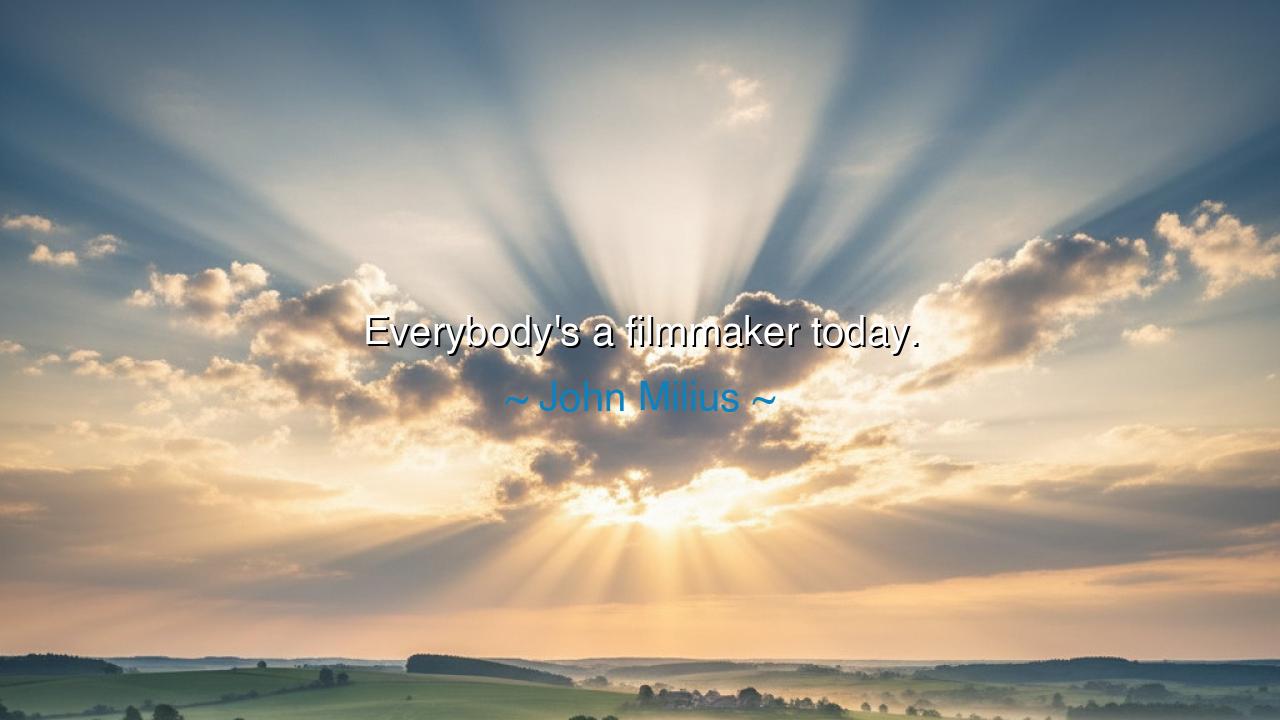
Everybody's a filmmaker today.






Hear the voice of John Milius, a maker of stories and a warrior of words, who declared: “Everybody’s a filmmaker today.” Though spoken in the age of glowing screens and digital tools, the meaning carries the weight of ancient truth. For in every heart burns the fire of storytelling, and in every eye lies the power to frame the world. Once, the creation of films was the sacred domain of a chosen few, those who commanded mighty machines and vast treasures. But now, with devices small as a palm and swift as thought, the gates of creation have been thrown open. Truly, Milius saw that the age of the people’s vision had dawned.
To call all men and women filmmakers is to remind us that we are no longer mere spectators in the great theater of life. With the rise of the moving image, every soul may become not just witness but chronicler, not just observer but shaper of narrative. The ancients carved their tales upon stone and papyrus; our forebears sang their stories by firelight. Today, we wield cameras as they wielded chisels, recording joys, sorrows, injustices, and triumphs. Thus, the act of storytelling has been restored to its rightful place: not the privilege of the few, but the calling of the many.
Consider the story of the Arab Spring, when ordinary people, armed not with swords but with smartphones, recorded the cries of freedom and spread them across the world. A farmer, a student, a shopkeeper—suddenly they were filmmakers, bearing witness to tyranny and hope. Their images, unpolished but truthful, shook thrones and inspired millions. No longer could the rulers of men control the tale, for the power of vision had been dispersed among the people. Here, the truth of Milius’ words became flesh: everybody could tell the story, and the world could not look away.
Yet this truth is not without peril. For when everybody is a filmmaker, the flood of stories can drown the unwary. Lies may spread as swiftly as truth; shallow spectacle may overshadow the deep song of the soul. Just as fire can warm or burn, so too can the camera enlighten or deceive. The ancients warned of hubris—the arrogance of wielding power without wisdom. So too must we heed caution in this age, lest we trade the pursuit of truth for the hunger of vanity.
But still, the gift is sacred. For in this great democratization of the image lies the chance for every human voice to be heard. A mother may capture the first steps of her child; a wanderer may share the majesty of a mountain sunrise; an elder may tell a tale long forgotten and pass it on, clothed now in light and sound. What once required halls of studios and rivers of gold can now be achieved with a spark of imagination. Truly, every man and woman who dares to record, to shape, to share is part of the eternal brotherhood of storytellers.
The lesson for us, then, is clear: we must not squander this gift. To hold a camera is to hold responsibility—to show truth, to inspire, to preserve, not merely to entertain. We must cultivate discernment, striving always for honesty in what we create. For the power that once belonged to kings and studios now rests in the hands of children, and with it comes the duty to choose wisely what we reveal.
So, beloved listeners, let this be your guide: be not a careless filmmaker, but a truthful one. Record not only for applause, but for memory. Tell the stories that uplift, that warn, that connect. Seek to capture the light of truth even in shadow, and let your lens be a mirror of the human spirit. For truly, as John Milius spoke, everybody is a filmmaker today—but it is for each of us to decide whether our films shall be fleeting noise or lasting flame.






AAdministratorAdministrator
Welcome, honored guests. Please leave a comment, we will respond soon